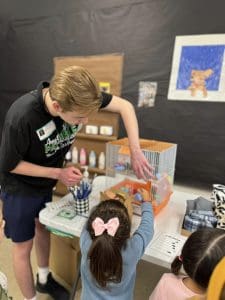
Azle ISD Special Education and Pre-K Play with Pets
Azle ISD students from the district’s special education Transition Center visited Silver Creek Elementary for a Pre-K Pet Adoption Day! The young professionals focused on
If you’re a school district superintendent, trustee, or within the communications department, we’d love to share with you how We Go Public is the best choice for amplifying your ISD’s voice, successes, and offerings. Click
here below and we’ll set up a convenient time with your team.

* Campaign (Go Public)

Find Texas Schools and Independent School Districts
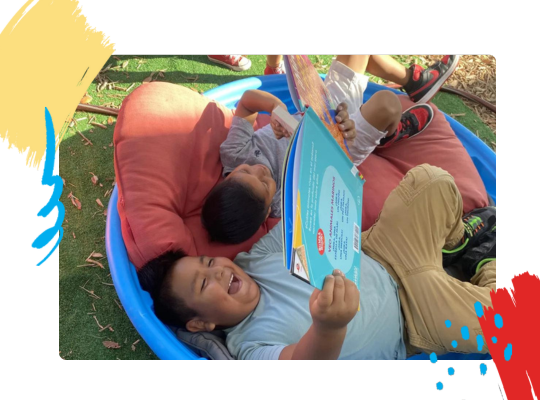
Pre-K students at East Central ISD's Salado Elementary engage with the outdoor workspaces.
Short for Pre-kindergarten, Pre-K refers to a specialized school or class tailored for children under the age of five. Pre-K prepares children for kindergarten and beyond.
Starting Age: Preschool typically begins two years prior to kindergarten, with most programs setting a minimum enrollment age of 3 years old.
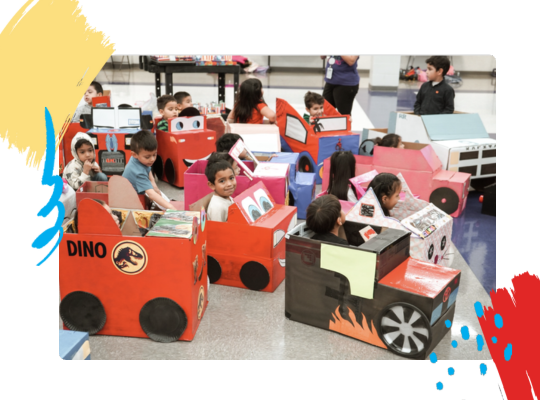
Angleton ISD's Pre-K students created a box car of their own and enjoyed a drive-in movie.
Curriculum Development: Pre-K curriculum and teaching strategies are developed and provided by educators and degreed child development experts, adhering to state guidelines and standards.
State Assessment: Pre-K curriculum is reviewed and assessed by the state’s education agency to ensure alignment with state standards.
Learning Environment: Effective preschool classrooms provide a safe and nurturing environment where children feel valued and supported, fostering their cognitive, social, and emotional development.
Age Difference: Preschool typically refers to children ages 2-3, while Pre-K is designed for older children aged 3-5.
Curriculum Similarities: Both preschool and Pre-K curriculums promote learning through play-based activities, fostering creativity, problem-solving skills, and social development
Head Start is the largest Pre-K program in America and provides free Pre-K programs offered in schools. Students must meet eligibility requirements. Enrollment availability is determined by each school. Head Start is administered by the Office of Head Start within the U.S. Department of Health and Human Services.
Listening- Follow two or three step directions during activities such as setting the table, playing, or cleaning up. Have short conversations. Listen to stories and directions from adults. Play with friends.
Reading -Name familiar characters or events from books. Guess what happens next in a story. Participate in story time and choose their own books.
Writing- Make scribbles, line marks, and letter-like forms when asked to write. Use a variety of writing and drawing materials such as different types of pens, crayons, markers, or paintbrushes. Play with letter blocks, magnets, and other reading materials.
Speaking- Ask questions and wait for answers. Use many words when speaking about feelings, places, people, or things. Have conversations with friends and adults.
Describing- Talk about plants and animals and what they look or feel like. Talk about the weather. Go on nature walks. Play outside. Read books about plants, animals, weather, and seasons. Play with and talk about toy cars that go different speeds, balls that bounce at different heights, or bubble wands.
Counting- Count up to 10. Read books, sing songs, and play games that include counting. Play with a variety of objects that can be counted such as blocks or shapes.
Identifing Shapes- Name and create common shapes. Play with blocks of different shapes and sizes. Play with materials to make shapes such as play dough.
Fine Motor Skills – Squeeze small objects between thumb and forefinger. Draw shapes and write some letters and numbers. Dress and undress with little help. Play with clay and play dough. Use tools such as tongs, clothespins, or safety scissors. Write and draw with a variety of pens, markers, pencils, and crayons. Make art with materials of different textures.
Gross Motor Skills- Hop, skip, jump, and gallop. Climb jungle gyms. Ride a tricycle. Play games with a variety of movements. Play outside.
Emotions- Talk about emotions and feelings. Read books about emotions. Use puppets to role play emotions. Name characters’ feelings in books.
Health & Hygiene- Wash hands after using the toilet and before eating. Name body parts. Sing songs and play games that identify body parts such as Follow the Leader or Head, Shoulders, Knees and Toes. Read books about washing hands, getting ready for school, or bed time.
Relationships with Others- Enjoy playing and talking with adults and friends. Learning Strategies: Play games in small or large groups. Read books about playing with friends.
https://tea.texas.gov/academics/early-childhood-education/prek3familyguideb.pdf
Listening- Follow two or three step directions during activities such as setting the table, playing games, or cleaning up. Have conversations with expected words and responses. Play games with multiple steps. Play in large and small groups. Listen to stories and directions.
Writing- Use marks or letters to write Use writing materials in multiple areas of the classroom, such as creating signs in block play or grocery lists in the pretend play center. Write in a journal and make books or drawings with words.
Speaking- Ask and respond to questions. Use many words when speaking about feelings, people, places, or things. Have conversations with friends and teachers. Play games with friends. Read books out loud
Reading- Enjoy being read to and exploring books. Name rhyming words. Play games with multiple steps. Play in large and small groups. Listen to stories and directions.
Describing- Talk about the color, size, shape, and feel of plants, animals, and earth materials such as rocks, soil, or sand. Go on nature walks. Play outside. Grow plants and discuss their progress. Read books about plants, animals, weather, and seasons.
Counting- Count from 1-30. Count 1-10 objects, with one count per object. Sing songs or play games that include counting. Play with a variety of objects that can be counted such as blocks or shapes.
Identifying Shapes- Name and create shapes. Play with blocks of different shapes and sizes. Play with materials such as play dough and toothpicks to make shapes.
Comparing Objects Place objects from shortest to tallest or tallest to shortest. Use measurement words such as “taller”, “shorter”, “longer” or “smaller”. Play with objects that can be sorted and arranged such as blocks or figures. Play with and talk about toy cars that go different speeds, balls that bounce at different heights, or bubble wands that create different sized bubbles. Guess the length, height, or volume or objects such as buckets, fish tanks, or furniture.
Fine Motor Skills- Use tools such as forks, spoons, tweezers, clothespins, or paintbrushes with ease. Dress and undress without help. Draw shapes and write letters and numbers. Play with clay or play dough. Write and draw with different types of writing and art materials such as pens, pencils, paint brushes or crayons. Make art by tearing paper, using cookie cutters, or stringing beads.
Gross Motor Skills- Stand on one foot. Hop, skip, jog, jump, and gallop. Carry a bowl or plate of food from one spot to another. Play games with many movements. Help with meal times. Play outside.
Health & Hygiene- Wash hands after using the toilet and before eating. Name body parts. Sing songs and play games that identify body parts such as Follow the Leader or Head, Shoulders, Knees and Toes. Read books about washing hands, getting ready for school, or bed time routines.
Relationships with Others- Enjoy playing with friends and adults. Initiate play and conversations. Have conversations with adults and friends. Play with friends. Read books about playing with friends, taking turns, or helping others. Have a classroom job such as a greeter, door holder, or line leader.
Emotions & Behavior- Talk about and name emotions and feelings. Follow classroom rules and routines with help and reminders from the teacher. Read books about emotions. Use puppets to role play emotions. Name characters’ feelings in books.
https://tea.texas.gov/sites/default/files/PreK_4_Family_Guide.pdf
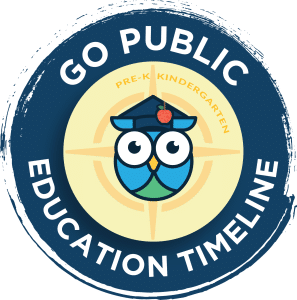
Go Public’s Education Timeline helps parents learn what to expect for early education, Pre-K, and kindergarten.
Public school Pre-k programs help prepare children for a smooth transition to elementary school.

Azle ISD students from the district’s special education Transition Center visited Silver Creek Elementary for a Pre-K Pet Adoption Day! The young professionals focused on

Dickinson ISD recently organized a trip for San Leon Elementary School students to Froberg’s Farm, a beloved local destination. Here, students and their families engaged
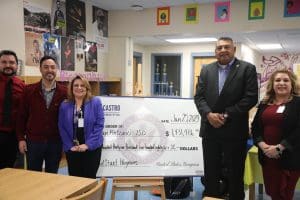
U.S. Congressman Joaquin Castro visited South San Antonio ISD as he came to tour our Pre-K/Headstart Program. South San Antonio ISD was recently awarded $1,431,486.00
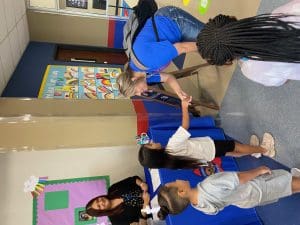
Royal ISD district and campus leaders were treated to a tour of the Royal Early Childhood Center. The group was greeted by ECC Ambassadors followed
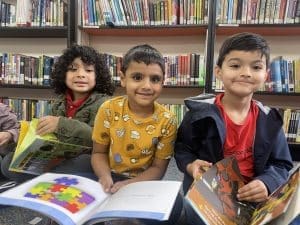
Fort Bend ISD’s prekindergarten students and their families received a generous book donation from a new statewide program that encourages reading at an early age.
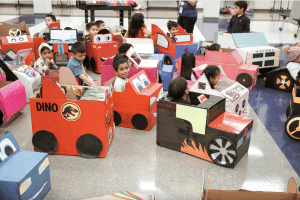
Overload of cuteness as Angleton ISD pre-k kiddos create cars out of cardboard boxes! At Angleton’s Central Elementary School, pre-k students have been learning all

Early Childhood Reading: What Public School Districts Do for You As a child grows, they are constantly learning; learning to eat, learning to walk, learning
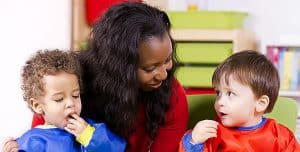
Understanding the Choices and Guidelines for Finding a PreK My kids are in elementary and high school, and it seems like a lifetime ago when
© Copyright 2024 – We Go Public – All Rights Reserved

If you want to take advantage of this benefit or learn more about how a membership can help your organization please click the button below.